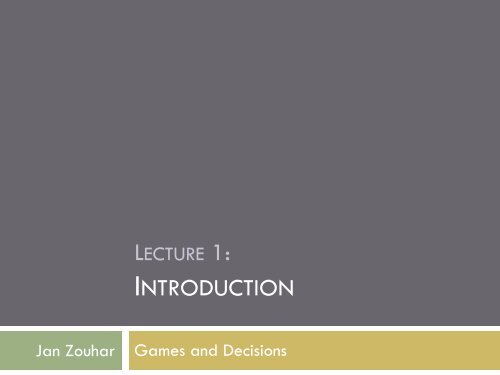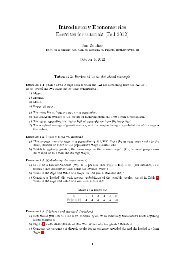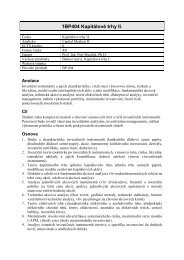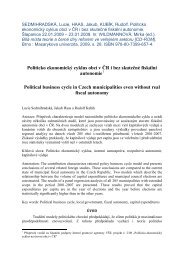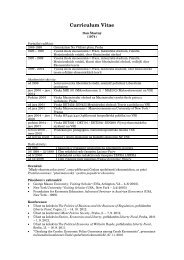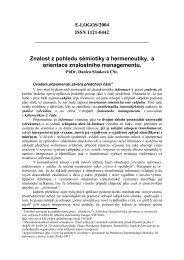Lecture 1: Introduction
Lecture 1: Introduction
Lecture 1: Introduction
You also want an ePaper? Increase the reach of your titles
YUMPU automatically turns print PDFs into web optimized ePapers that Google loves.
LECTURE 1:<br />
INTRODUCTION<br />
Jan Zouhar<br />
Games and Decisions
Course Information<br />
2<br />
<strong>Lecture</strong>r: Jan Zouhar<br />
e-mail: zouharj@vse.cz<br />
web:<br />
nb.vse.cz/~zouharj<br />
office: room NB431<br />
office hours: Mon 14:30 – 16:00<br />
Thu 14:30 – 16:00<br />
Supervisor: Martin Dlouhý<br />
e-mail: dlouhy@vse.cz<br />
web:<br />
nb.vse.cz/~dlouhy<br />
office: room NB435<br />
office hours: (to be specified, see ISIS)<br />
Games and Decisions<br />
Jan Zouhar
Course Information<br />
(cont’d)<br />
3<br />
<br />
<br />
Course Requirements:<br />
<br />
<br />
50 points: assignments<br />
• 5 problems, 10 points each<br />
• will appear on the website soon<br />
• due date: 16 th December<br />
50 points: final written exam<br />
Grading scale: standard ECTS points<br />
90 – 100 points: excellent (1)<br />
75 – 89 points: very good (2)<br />
60 – 74 points: good (3)<br />
0 – 59 points: failed (4)<br />
Games and Decisions<br />
Jan Zouhar
Course Information<br />
(cont’d)<br />
4<br />
<br />
Recommended reading:<br />
<br />
<br />
<br />
<br />
<br />
<strong>Lecture</strong> notes and presentations<br />
MAŇAS, M., DLOUHÝ, M.: Games and Economic Decisions,<br />
Oeconomica, 2009<br />
DLOUHÝ, M., FIALA, P.: Úvod do teorie her, VŠE, 2007 (in Czech)<br />
Virtually any other book on game theory<br />
Internet sources (e.g. www.gametheory.net, www.wikipedia.org)<br />
Games and Decisions<br />
Jan Zouhar
Game 1: Guess ⅔ of the Average<br />
5<br />
<br />
Prize money: 20 Kč for the winner<br />
<br />
Rules:<br />
<br />
<br />
pick an integer between 0 and 100 and write it down onto a piece of<br />
paper<br />
winner: the number closest to ⅔ of the average of all the guesses,<br />
without going over (i.e., the highest guess less than or equal to ⅔ of<br />
the average)<br />
Empirical results: winning guesses between 15 and 21<br />
<br />
High guesses can mean two things:<br />
1. not understanding this is a strategic game<br />
2. believing the others do not understand this is a strategic game<br />
Games and Decisions<br />
Jan Zouhar
Game 2: An “Unfair” Auction<br />
6<br />
<br />
<br />
Compete in an English auction (“open-outcry” type) for a 100 Kč<br />
banknote<br />
Rules:<br />
<br />
<br />
<br />
<br />
starting price: 20 Kč<br />
buyers cry out increasing bids<br />
the 100 Kč banknote sold to the highest bidder<br />
(at a price equal to his/her bid)<br />
the second-highest bid is paid to the auctioneer without any<br />
compensation<br />
Empirical results:<br />
PAUL B. FARRELL: Lizards, rats & the investor's primitive brain.<br />
Games and Decisions<br />
Jan Zouhar
What Is a Game?<br />
7<br />
<br />
<br />
many types of games: board games, card games, video games, field<br />
games (e.g. football)<br />
we focus on games where:<br />
<br />
<br />
<br />
<br />
<br />
there is more than one decision maker (player)<br />
there is some choice of action where strategy matters<br />
the game has one or more outcomes, e.g., someone wins, someone<br />
loses<br />
the outcome depends on the strategies chosen by all players – there<br />
is strategic interaction<br />
the players are rational (are aware of the strategic interaction and<br />
act accordingly)<br />
→ not games of pure chance, such as Bingo<br />
Games and Decisions<br />
Jan Zouhar
Game vs. Decision Problem<br />
8<br />
<br />
Example: meal ordering: 4 people come to a restaurant<br />
1. every person pays for her own meal → a decision problem<br />
2. everyone agrees to split the bill evenly → a game<br />
<br />
when does a game become a decision problem?<br />
<br />
<br />
players do not interact, no interdependencies between strategies<br />
only 1 player (e.g., Solitaire)<br />
Games and Decisions<br />
Jan Zouhar
Strategy Interactions in Practice<br />
9<br />
<br />
<br />
<br />
<br />
<br />
International trade:<br />
<br />
levels of imports, exports, prices depend not only on your own tariffs<br />
but also on tariffs of other countries<br />
Production / market structure:<br />
<br />
price depends not only on your output but also on the output of your<br />
competitor<br />
Labor:<br />
<br />
promotions like tournaments: your chances depend not only on your<br />
effort but also on efforts of others<br />
Political economy:<br />
<br />
who/what I vote for depends on what everyone else is voting for<br />
Public Goods:<br />
<br />
my benefits from contributing to a public good depend on what<br />
everyone else contributes<br />
→ suitable application areas of game theory<br />
Games and Decisions<br />
Jan Zouhar
Game theory<br />
10<br />
Definitions:<br />
“…is a formal way to analyze interaction among a group of rational agents<br />
who behave strategically.”<br />
“…can be defined as the study of mathematical models of conflict and<br />
cooperation between decision-makers.”<br />
“…offers insights into economic, political, or any social situation that<br />
involves multiple participants with different goals.”<br />
a.k.a. :<br />
decision theory, conflict analysis, analysis of strategic behavior<br />
Games and Decisions<br />
Jan Zouhar
Game Theory – Descriptive vs. Normative Use<br />
11<br />
<br />
<br />
<br />
normative approach:<br />
<br />
<br />
<br />
the analysis of rational behavior<br />
goal = find the optimal, or “most rational” form of behavior<br />
(or sometimes, the winning strategy)<br />
studies the way people should decide<br />
descriptive approach:<br />
<br />
<br />
<br />
the analysis of the real-life behavior<br />
• sometimes, rational decisions are not obvious / people are not<br />
rational → normative approach gives us no clue (as in game 1)<br />
goal = study the way people really behave (for predictions etc.)<br />
studies the way people decide in practice<br />
normativity of a given game:<br />
<br />
on average, 80% real-life players act according to the normative<br />
analysis → the game is 80% normative<br />
Games and Decisions<br />
Jan Zouhar
Game Theory – Historical Milestones<br />
12<br />
<br />
<br />
<br />
<br />
<br />
<br />
1838: AUGUSTIN COURNOT, Researches into the Mathematical Principles<br />
of the Theory of Wealth<br />
1913: ERNST ZERMELO – existence of winning strategies in games like<br />
chess<br />
1920s and 1930s: works of ÉMILE BOREL and JOHN VON NEUMANN<br />
1944: J. VON NEUMANN and OSKAR MORGENSTERN, Theory of Games<br />
and Economic Behaviour<br />
1950s: works of JOHN NASH<br />
(film: A Beautiful Mind )<br />
Nobel prizes:<br />
<br />
<br />
1994: NASH, HARSANYI, SELTEN<br />
2005: AUMANN, SCHELLING<br />
Games and Decisions<br />
Jan Zouhar
↑ a film about John Nash ↑<br />
→ John Nash (a recent photo) →<br />
Games and Decisions<br />
Jan Zouhar
Game Theory – Applications<br />
14<br />
<br />
<br />
<br />
<br />
<br />
<br />
Economics and business<br />
<br />
oligopolies, market structure, auctions, bargaining, fair division<br />
Political science<br />
<br />
voting systems, coalition formation, public choice, war bargaining<br />
Biology<br />
<br />
evolutionary game theory, signaling and communication games<br />
Computer science and Logic<br />
<br />
multi-agent systems, computational complexity<br />
Philosophy<br />
<br />
cognitive theories (common knowledge), ethics<br />
Theology<br />
<br />
Pascal’s gambit<br />
Games and Decisions<br />
Jan Zouhar
15<br />
Game Theory – Terminology<br />
Game theory<br />
game<br />
player<br />
strategy<br />
strategy space<br />
payoff<br />
rational and intelligent<br />
Reality<br />
conflict situation, decision situation<br />
decision-maker, participant, individual,<br />
firm, political party<br />
decision<br />
list of alternatives, feasible decisions<br />
results, outcomes, consequences<br />
maximizing utility or profit, knowing the<br />
rule of the game<br />
Games and Decisions<br />
Jan Zouhar
The elements of a Game<br />
16<br />
<br />
<br />
<br />
players<br />
number of players (2+)<br />
<br />
<br />
<br />
<br />
possibilities of cooperation<br />
existence of coalitions<br />
does nature/chance play a role?<br />
perfect/imperfect information<br />
strategies, strategy spaces:<br />
<br />
discrete/continuous<br />
simultaneous games (game 1) and sequential games (game 2)<br />
payoffs<br />
<br />
constant-sum games vs. variable-sum games<br />
→ different modeling techniques for different games<br />
Games and Decisions<br />
Jan Zouhar
Prisoner’s Dilemma<br />
17<br />
2 players (suspects, potential prisoners A and B)<br />
<br />
<br />
<br />
<br />
insufficient evidence for a conviction<br />
questioned separately, offered to cooperate with the police<br />
(betray)<br />
each player 2 strategies: betray or remain silent<br />
4 possible outcomes:<br />
neither betrays 1 year sentence for both<br />
A betrays A goes free, B 10 years<br />
B betrays B goes free, A 10 years<br />
both betray both 5 years<br />
<br />
what would you do if you were one them?<br />
Games and Decisions<br />
Jan Zouhar
Prisoner’s Dilemma<br />
(cont’d)<br />
18<br />
<br />
<br />
a game in normal (or strategic) form<br />
mathematical model: a bimatrix game<br />
Player B<br />
A \ B Stay silent Betray<br />
Player A<br />
Stay silent –1 , –1 –10 , 0<br />
Betray 0 , – 10 – 5 , – 5<br />
<br />
strategy “stay silent” strictly dominated: no matter what B does, A is<br />
better off betraying him<br />
Games and Decisions<br />
Jan Zouhar
Prisoner’s Dilemma<br />
(cont’d)<br />
19<br />
Real-life examples:<br />
<br />
Politics<br />
<br />
arm race → betrayal = military<br />
expansion<br />
<br />
<br />
<br />
Environment<br />
<br />
CO 2 emissions → betrayal = not cutting down on emissions<br />
Sport<br />
<br />
steroid use → betrayal = taking steroids<br />
Economics<br />
<br />
advertising → betrayal = advertising<br />
Games and Decisions<br />
Jan Zouhar
Battle of the Sexes<br />
20<br />
<br />
<br />
<br />
young couple dating without means of coordination (i.e., batteries gone<br />
in the mobile phones)<br />
preliminary discussion: two options<br />
<br />
<br />
model<br />
<br />
<br />
<br />
football game (meet at 6 PM by the stadium)<br />
shopping (6 PM at the entrance of a shopping mall)<br />
another normal form game<br />
strategies: football and shopping<br />
outcome quantification: utility<br />
Games and Decisions<br />
Jan Zouhar
Battle of the Sexes<br />
(cont’d)<br />
21<br />
Boy<br />
Girl \ Boy Football Shopping<br />
Girl<br />
Football 2 ; 3 0 ; 0<br />
Shopping 1 ; 1 3 ; 2<br />
<br />
two “stable” solutions: (F,F) and (S,S)<br />
→ Nash equilibrium (see lecture 2)<br />
Games and Decisions<br />
Jan Zouhar
Battle of the Sexes<br />
(cont’d)<br />
22<br />
Modification:<br />
<br />
<br />
<br />
the girl leaves earlier, decides where to go, manages to catch the boy on<br />
the phone at home, and tells him where she is<br />
a significant change: a sequential game (decisions go in turns)<br />
modeled as a game in extensive form<br />
models use decision trees<br />
Girl<br />
F<br />
S<br />
Boy<br />
Boy<br />
f<br />
s<br />
f<br />
s<br />
(2;3) (0;0) (1;1) (3;2)<br />
Games and Decisions<br />
Jan Zouhar
LECTURE 1:<br />
INTRODUCTION<br />
Jan Zouhar<br />
Games and Decisions


